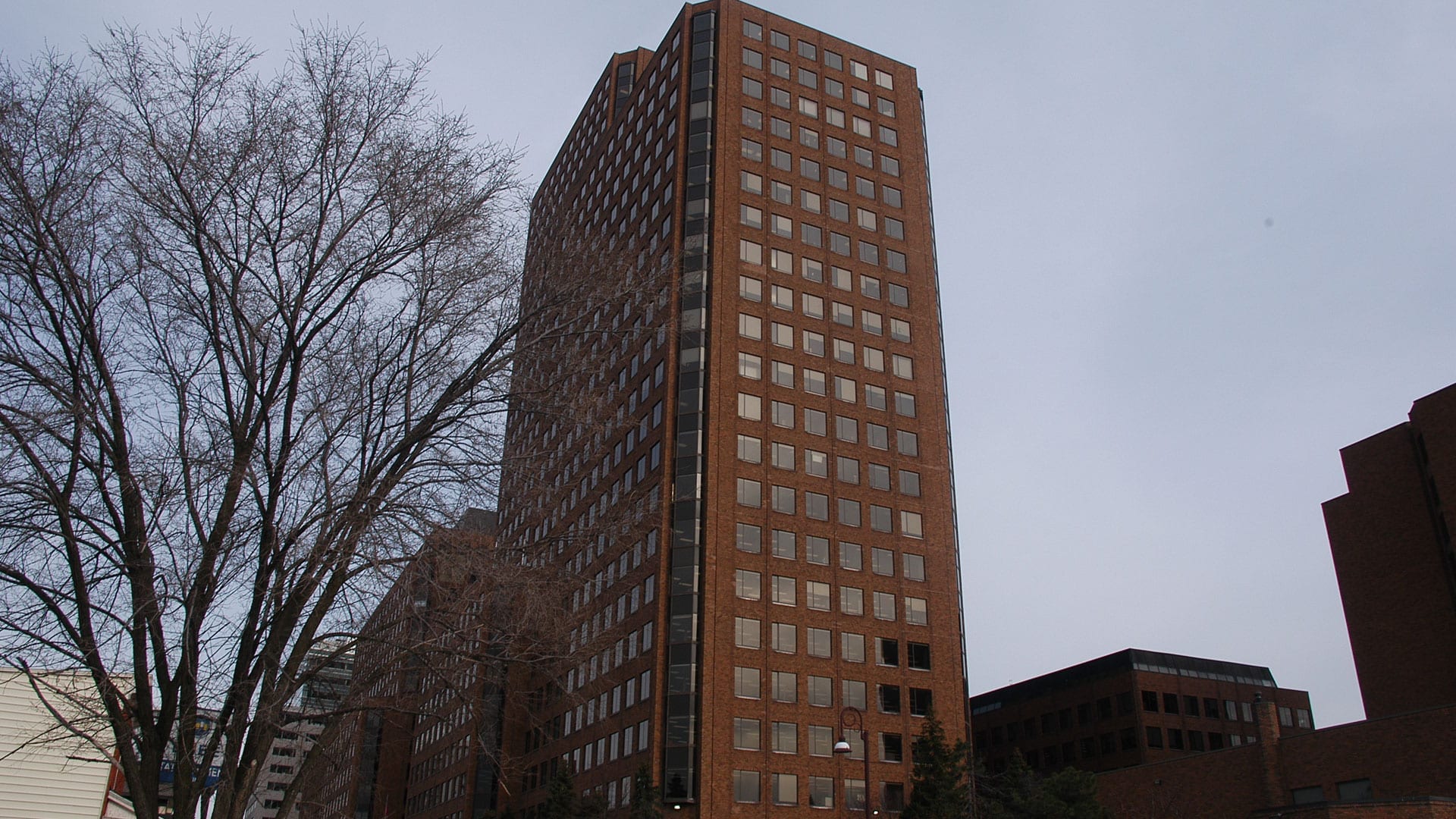
The assessment was undertaken in September 2020 after ISC "received concerns" about the Halifax workplace. Photo: Paul Poirier/APTN
The health branch of Indigenous Services Canada must now heal itself after a confidential workplace assessment found long-festering issues of harassment, fear and dysfunction caused “considerable harm” to employees in the Maritimes.
First Nations and Inuit Health Branch (FNIHB) called on HR Atlantic, an independent consulting firm, to diagnose the work culture at its Halifax office after reports of a toxic work environment surfaced last November.
On Jan. 18, the firm submitted a bleak confidential final report to the department’s top bureaucrats, which was obtained by APTN News through the Access to Information Act.
It revealed employees felt abandoned by Ottawa and harboured profound distrust of senior management following years of perceived bureaucratic inertia. The consultants concluded it was a fractured relationship that would take time to heal, issuing seven recommendations to start the process.
“A strong emphasis in the recommendations is a restorative approach in order to repair and reconcile the harm that was articulated throughout the assessment,” the consultants wrote in their executive summary. “This journey of reconciliation within the Team will take time.”
The firm conducted one-on-one virtual interviews with 21 employees over the month of November.
Senior managers were first on the list of proposed interviewees.
The government redacted almost all sections of the report that discussed upper management, however, except for one damning section about headquarters in Ottawa. Nevertheless, the recommendations reveal that many problems come from the top.
“The Consultants heard that multiple complaints with respect to disrespectful and harassing behaviour had been advanced and not addressed,” they explained.
“Staff feel there has been a lack of accountability and action on the part of leadership within the Atlantic Branch and at Headquarters with respect to complaints and concerns advanced by employees.”
And that’s just where the problems start.
Introduction email bungled
The assessment itself immediately ran into challenging roadblocks that had “a significant impact” on the process, the authors conceded.
The initial email introducing the process to the proposed participants “was not blind copied.” In other words, the recipients saw who was and wasn’t selected to participate.
The employees could thus see that the regional executive officer — one of the branch’s top officials — was not included on the introduction email, which the consultants attributed to an “oversight.”
It was a significant oversight.
According to CBC/Radio Canada, which first obtained this report, anonymous staff said they felt demeaned, humiliated and bullied by REO Debra Keays-White.
The report does not mention the REO by name, only title and gender. It notes she had “exceptional” relationship-building skills with communities, chiefs in particular. It was a “common positive comment” the consultants said they heard.
The firm also reported that most people were hardworking and deeply dedicated to the health branch’s mandate to deliver services to First Nations and help them build capacity toward self-determination.
“The general consensus is the Team is a group of competent, capable and committed individuals,” said the report.
Unfortunately, the good stopped there.

“A few individuals felt that the positivity in relation to the Team extended to the REO, however the majority did not,” the authors went on.
“Many felt the management style of the REO (redacted) the time needed to develop adequate competencies in new hires, thus further exacerbating her need to micromanage the work of others.”
It appears the employees’ concerns dogged the process following the bungled email introduction that excluded the REO.
“Questions were still being raised by staff about the criteria for being included as a participant in this assessment” even as it entered the report-writing phase, the consultants explained.
They did indeed meet with the REO before the assessment began to introduce themselves, but it’s not clear if she was formally interviewed, because the sections that deal with senior management were largely withheld.
Ottawa turned ‘blind eye’ for years, say staff
But the unredacted portions reveal employees felt isolated, ignored and neglected by headquarters in Ottawa.
“Department is seriously flawed- senior leaders in Ottawa have failed us… You are not the first ones to do this- there have been others,” one participant shared. “Ottawa has allowed this to fester, continue to send folks. I am angry and upset they have allowed this to happen.”
Another employee said “worst thing is HQ,” according to the report. “Over the years (they) have been told what is going on and don’t do anything. Demoralizing for staff- this is worse than what is happening in the office. Repeatedly ignore the issues. Nothing happens.”
Summarizing their findings, the consultants said there was a very real sense departmental brass had turned a “blind eye” to the toxic situation in the Halifax office.
“This inaction on the part of headquarters was heard to have been going for years,” they wrote, adding that, due to past inaction, staff had little faith anything would change.
Still, the authors stopped short of asking headquarters to apologize.
“Consideration should be given to whether an acknowledgement or recognition of some nature is appropriate from Headquarters,” it said, while assuring senior managers they don’t need to admit wrongdoing.
“An acknowledgement need not be about blame or admissions,” the consultants added. “It is about demonstrating and understanding of the situation and its impact.”

Staff also felt that department heads didn’t understand or recognize the jurisdictional complexity involved in providing health services to First Nations across the Maritimes.
Atlantic region, uniquely, must deliver services across four provinces. That means co-ordinating with four provincial health departments alongside diverse First Nations themselves.
The non-stop pressure from the top led overworked employees to feel that their “work environment is constantly in crisis,” more like an “ICU” or an “ER” than an office.
“We operate in a crisis situation,” one employee said.
“(It’s) more of a crisis management organization as opposed to one that takes the time to identify key priorities,” said another.
The consultants concluded, “The feeling of always being in crisis stemmed from a chronic lack of direction, planning, delegation, priority setting and appropriate assignment of work.”
ISC operations are “highly decentralized,” according to government briefing documents, and regional offices have significant authority. Atlantic region had a budget of $514 million and 247 full-time employees last year.
ISC was created officially in 2019 after the Liberals slashed the Aboriginal Affairs department in two. FNIHB was migrated out of Health Canada over to ISC during the restructuring.
The report reveals employees resisted the process, which apparently gutted the health branch’s human resources and corporate support positions by up to 25 per cent. As a result, Atlantic region was receiving HR support from Yellowknife.
“The movement of Indigenous Health to ISC was heard to be resisted by both the staff and the Partners. It was heard that this transition was not smooth and has had lasting effects on the work environment,” the consultants said.
“It was noted the migration of Indigenous Health under the umbrella of ISC has been received negatively by some because ISC is the department that is also responsible for the Indian Act.”
Maritimes staff are not alone in that view. APTN has spoken with multiple former and current FNIHB employees from different regions who shared it.
In Depth:
Ministers promise ‘thorough review’ following APTN report on racism in their departments
‘Incredibly toxic’: More Indigenous women share stories of racism in the federal bureaucracy
Several Indigenous bureaucrats told APTN the toxic culture of bullying, revenge and fear can destroy employees’ psychological wellbeing and even ruin lives.
In this report, two large sections subtitled “fear” and “psychological health and safety” were completely redacted, along with sections on “trust” and “accountability.”
In a notable omission, the unredacted portions do not mention systemic racism, misogyny and gender-based harassment, which sources have described as soul-crushing and rampant.
The consultants did include a sentence under the heading “cultural framework” that tiptoes around the issues of colonialism, marginalization and racial oppression.
The consulting firm concluded “there were underlying foundational cultural aspects of this workplace” that created “a nuanced environment for the participants of this workplace assessment and played a role in the broader themes.”
A large portion of this part was also blacked out. The assessment explained more below.
“Canada’s historical treatment of First Nations and Indigenous peoples, and the Truth and Reconciliation Commission’s Call to Action provides an additional backdrop to the challenges staff face in their daily work.”
‘Lack of trust, lack of accountability, and fear’
Among those challenges were confusion, worker burnout, mistrust, hiring inequities as well as disrespectful and harmful behaviour.
The reviewers found some employees didn’t know who was on the team or even what their own positions were.
Employees described their workload as unsustainable, exhausting and ridiculous. Some attributed it to pressure from Ottawa brass along with the REO who “can overcommit the team” to the department heads.
“One interviewee described the sense of drowning in work, no matter how much time they spent on their tasks,” reported the assessors.
The workplace culture — characterized as a “crisis and emergency environment” — resulted in high turnover and poor staff retention particularly impacting Indigenous bureaucrats.
“We need to get more Indigenous people into this business so they can take over,” said one person. “We have to be more aggressive in attracting Indigenous people to take on this work.”
Finally, the assessment boiled down the toxic dysfunction to three root factors: “lack of trust, lack of accountability, and fear.”
To heal this fractured environment, the consultants advised reconciling relationships, rebuilding trust and reforming senior management.
Recommendations one and two proposed a “transition period” to restore stability and a feeling of safety.
Recommendation four called for a review of policies and procedures regarding harassment in the workplace to ensure complaints are addressed promptly.
“Trust, accountability and a sense of safety must be rebuilt within the senior management team and their leadership,” the consultants urged in yet another bleak assessment.
“This restorative work should address aspects of the work environment that are problematic from a health and safety perspective,” they added, “including disrespectful and harmful behaviours that some of the participants highlighted and believe were not addressed.”
The document was labeled confidential and not for distribution beyond the offices of the deputy minister and acting senior assistant deputy minister, who the report doesn’t name.
The report only gathered employee sentiment and did not investigate specific allegations of harassment or make findings of fact.
The consultants did not recommend sharing the report with the staff.
They proposed to “virtually present” them with the assessment’s themes instead.
An ISC spokesperson was not made available for an interview by posting time.
Read the redacted version here:










